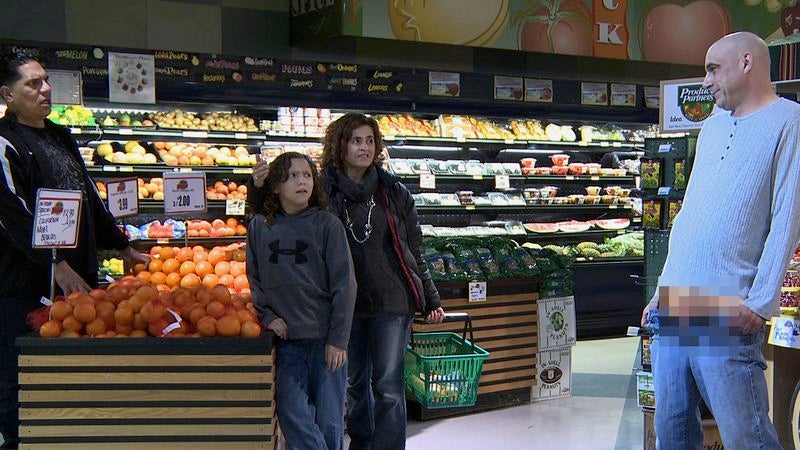PRINCETON, NJ—According to a study published Tuesday by sociologists at Princeton University, slapping every single person in a grocery store and then baring one’s genitalia in the produce department remains an act roundly frowned upon by modern society.
The comprehensive two-year study, which included observational trials in nearly 90 neighborhood supermarkets across the country, concluded that test subjects who ran through store aisles smacking dozens of people across the face before brazenly exposing themselves to their fellow shoppers were consistently ostracized by those around them, and in fact faced near-universal condemnation.
“Our research shows that the general public tends toward an overwhelmingly negative impression of individuals who assault one or more complete strangers in a grocery store and then remove their clothing to reveal their sex organs to a crowd of bewildered customers,” said study author Dr. Simon Byrne, who confirmed that such actions were welcomed by onlookers in zero percent of trials. “Regardless of age, race, or gender, we found that people tended to actively avoid or verbally denounce the individual for behaving in this manner, with our test subjects typically being thrown to the ground by security guards not long after they pulled out their penises and scrotums and began waving them around at nearby produce shoppers.”
“So now we can say with a fair degree of confidence that there is little room in the established social order for someone who chooses to physically batter others and brandish their gonads in public shopping centers,” Byrne added.
Byrne confirmed that researchers had attempted numerous permutations of the initial trial and in all instances recorded nearly identical results. In particular, researchers found that striking unassuming supermarket patrons with a fresh salmon fillet instead of an open palm, grabbing them by the wrist and using their own hands to slap themselves in the face, flashing their genitals in the baked goods department instead of the produce section, or disrobing completely and attempting to scan their own bare buttocks at the cash register all prompted similar displays of reproach and active social isolation.
Additionally, researchers noted that supermarket workers displayed comparable levels of displeasure as store patrons, with a significant majority of employees expressing strong disapproval toward trial participants who coldcocked cashiers with pineapples, doused themselves in barbecue sauce and then blindly hurled soup cans across the aisles while belting out “Yankee Doodle,” or pretended to be an overprotective hen and attacked anyone who approached the grocery store’s eggs.
“What piqued our interest most was a conclusion we made early on: Subjects who walked into these establishments, minded their own business, and left while still fully clothed seemed to be entirely accepted by their peers,” Byrne said. “However, if this same person later reentered the store, superglued a banana to his forehead, and then bowled over small children while bellowing like a charging rhinoceros, he would consequently run the risk of being treated like an unwanted outsider.”
“Similarly, individuals who ingested bottle after bottle of extra virgin olive oil until noisily vomiting it all over the checkout counter candy racks, conveyor belt, and fellow patrons faced far greater criticism than those who did not do this,” the sociologist continued.
Byrne told reporters that the study’s findings complemented earlier research he conducted in 2005, which conclusively demonstrated that social groups tended not to tolerate individuals who wildly swung loaves of French bread inches away from supermarket customers’ heads or commandeered a store’s intercom system and shrieked nonsensical gibberish until being dragged away.
“Through our research, we have gained considerable insight into just what effect certain public behaviors have on one’s ability to remain in positive esteem within the wider human population,” Byrne said, noting that his group’s experiments have thus far cost Princeton nearly $30 million, largely in lawsuits and public indecency fines. “However, there is still much work to be done. What effect does shaving off one’s body hair and attempting to swim in a grocery store’s lobster tank have on social acceptance? What if one were to wear only a cowboy hat, fill a shopping cart with ground beef and opened milk jugs, and upend it in the store manager’s office? Or empty every pint of ice cream from the freezer onto the floor and make snow angels?”
“Fortunately, our experiments at the Sam’s Club on Nassau Park Boulevard this coming weekend could provide just the answers we’re looking for,” he added.







